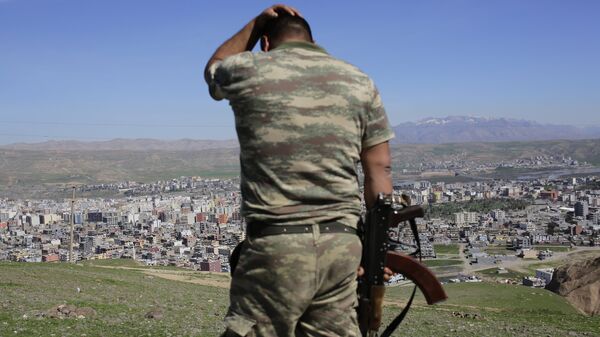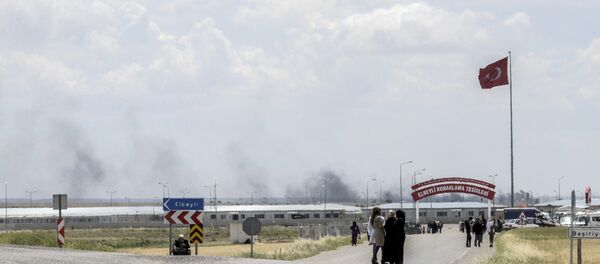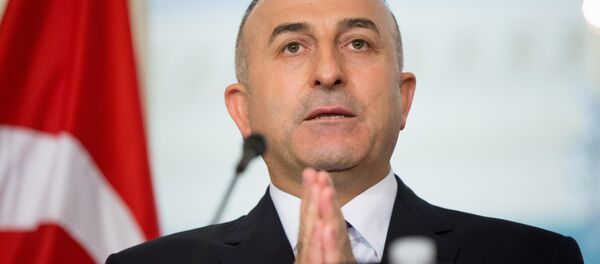The Russo-Turkish thaw is likely to add a new dimension to the Syrian peace process.
On Wednesday, Vladimir Putin held a telephone conversation with President of Turkey Recep Tayyip Erdogan, following Ankara's apology for the downing of a Russian Su-24 back in November 2015.
"[Vladimir] Putin said that the letter he received from the Turkish President opens the road for overcoming the crisis in bilateral relations and beginning the process of renewing joint efforts on international and regional issues and developing the two countries' relations in different areas," the Russian President's official website reported on June 29.
"Both presidents stressed the need to activate international cooperation to combat the terrorist threat that poses a danger to all countries," the report said.
According to a New York-based geopolitical analyst Ulson Gunnar, the ongoing fight against terrorism in the Middle East does require Turkey's aid.
"And its aid in this fight, particularly along the Turkish-Syrian border will serve as the true measure of Ankara's sincerity regarding its apology and regret for Russia's downed Su-24 warplane," Gunnar writes in his article for New Eastern Outlook.
For instance, Turkish journalist Murat Yetkin suggests that "due to the fact that Erdogan has proposed working together with Putin on 'regional crises and terrorism,' Syria might… come into picture" following the Russo-Turkish thaw and mending relations with Israel.
"Erdogan and the Justice and Development Party (AK Parti) government seem to be trying to recover from the diplomatic regression in recent years, which has resulted in Turkey losing friends in the neighborhood," Yetkin explained Tuesday in his op-ed for the Hurriyet Daily News.
In his recent interview with Sputnik, chairman of Turkey's Patriotic Party Dogu Perincek noted that after making the first steps toward the normalization of Russo-Turkish relations, it is important for Ankara to take similar steps in the direction of Damascus.
"The Syrian leadership has achieved great progress. It has ensured the integrity of the country, it was able to gain control over a substantial part of Syrian territory up to the regions in the north. Cooperation between Turkey and Syria is now inevitable. Reestablishment of relations with Russia will lead to a rapprochement with Syria. This is a very important point," the politician told Sputnik.
"Even when we had different points of view in solving the Syrian issue, we did not interrupt dialogue and made efforts to bring closer our positions. We will act similarly in the future. Iran and Russia should play an important role and participate in the process for lasting peace in Syria," Cavusoglu told Turkey's NTV broadcaster.
The Kremlin press service reported Wednesday that Russian Foreign Minister Lavrov is due to meet his Turkish counterpart at the Black Sea Economic Cooperation Council of Ministers of Foreign Affairs on July 1. During the upcoming meeting the foreign ministers are expected to discuss the ongoing situation in Syria with the focus on the crisis settlement.
Do Ankara's recent moves indicate a serious shift in Turkey's foreign policy?
According to British journalist John Wight, Ankara could have realized that it took the wrong side in the Syrian conflict.
"This [Turkey's apology] is a very significant gesture on the part of the Turkish government moving beyond the fact that it admits guilt over the shooting down of this aircraft, which was flying in Syrian airspace. It also suggests that Turkey is realizing that it has been following the wrong path when it comes to the Syrian conflict," Wight told RT.
Turkish journalist Mustafa Akyol echoes Wight in his article for the Hurriyet Daily News:
"Even the masters of Ankara, who are not very well-versed in seeing their own mistakes, have ultimately realized that they dug themselves into a pit with their emotional, ideological and ultimately arrogant foreign policy," the journalist pointed out, adding that Ankara has seemingly rediscovered "pragmatism" in its foreign policy.
Time will show whether Ankara's recent steps will transform into Turkey's new realpolitik.



